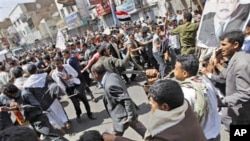Thousands of protesters gathered in Yemen's capital, Sana'a, Saturday, calling for President Ali Abdullah Saleh to step down a day after Egypt's President Hosni Mubarak resigned.
The protesters began marching toward the Egyptian Embassy but clashed with a group of pro-government demonstrators on the way.
The gathering points for protesters seemed to be at Sana'a University and the city's Tahrir Square, which bears the same name as the point of origin of the Cairo protests in Egypt.
Like Mr. Mubarak, President Ali has been in power for more than three decades - since 1978. In an effort to quell unrest, he has promised to step down at the end of his term in 2013.
Meanwhile, some 30,000 police are out in the Algerian capital to guard against a planned anti-government protest, which is illegal under Algeria's 19-year-old state of emergency. But reports say as many as 2,000 people are out on the streets anyway, calling for the end of the emergency laws and the resignation of President Abdelaziz Bouteflika.
The Algerian government has promised to lift the state of emergency in the future.
Activists in Bahrain are calling for protests to start Monday. In an effort to placate would-be demonstrators, Bahrain's king announced Friday that every family in the oil-rich kingdom will receive $1,000 as a sign of the monarch's "appreciation of the people of Bahrain."




